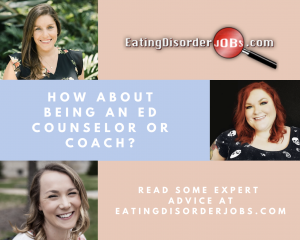Eating disorder counselors and coaches are also extremely helpful in eating disorder recovery. Over the years we’ve interviewed a variety of experts who hold these positions and they shared some great advice to those hoping to enter the field. Read more below:

“Value your relationships with everyone in your professional life from clients, to parents to fellow clinicians. Treat absolutely everyone whether they are above you or below with thoughtful respect. Authentically seek to support others even if it does not seem to monetarily benefit you in the moment. The more you can look out for other people in this field, the more bridges you will build and the more successful you will be.” – Ruth Roddy LPC
“Be gentle with yourself. I know for myself the drive can be strong to want to fix everyone and take their pain away, and this can create intense and unrealistic pressure on myself (and them!). Focus on what you can control and on being the most caring, authentic, competent provider you can be, and then know that this is also everyone’s own journey. Find ways of loving the work for the connections it allows you to make with amazing individuals and for how neat it is to be able to be a part of their journeys, whatever path it takes.” – Sarah Rzemieniak
“My advice to someone entering this field is 3-fold! (1) Niche, niche, niche! Don’t market yourself as being all things to all people, because you’re not. None of us are. Figure out what your ideal client is, and go after that population! (2) Get yourself to trainings/CEUs; especially if you’re interested in working with eating disorders, become a member of iaedp immediately and attend as many chapter meetings as you can. One of my professors once told me that, “If you ever wake up feeling like you know everything there is to know about your counseling niche, it’s time for you to quit the business”. There is always a different viewpoint in the eating disorder world, and you need to absorb all of them, in my opinion. (3) Self-Care. Working with clients that have body image and food issues is inevitably going to lead some self-discovery about how you’ve been impacted by diet culture over your own life. I lasted 7 months in the field before getting my own treatment team on board to support me. I know it sounds cliche, but you CANNOT pour from an empty cup. Get you a therapist, dietitian, PCP, psychiatrist, massage therapist; just whoever is needed to aid in taking care of you, because honey, you’re gonna need it.” – Katy Alaniz MA, LPC
“My advice for anyone new in the field is to be a sponge, and be a student for life. Immerse yourself in as much information as you can- podcasts, mentorship, books, peers doing the same work as you. Be open and vulnerable to all the things you don’t know, and that you can only learn by listening to your clients’ experiences and by those who have been in the field longer than you. At the same time, stay rooted in your own internal wisdom and intuition. Don’t be afraid to say I don’t know, and find out later.” – Hannah Turnbull, RDN
“Network, find professionals in your area and reach out to them. Take them out to coffee, meet with them at their office, volunteer, attend chapter meetings. It’s a good way to see to see what your day to day life could look like and it’s always encouraging to have support and colleagues who share similar values. Attend conferences, read books, seek knowledge. There are so many wonderful resources out there, get your hands on them. Get a supervisor/mentor. Seeking support from a supervisor/mentor is invaluable and can really help you navigate cases by seeing them from a different perspective. Supervisors can provide a safe place to be able to discuss day to day challenges. Make mistakes and learn from them. No one is perfect, mistakes happen and when they do acknowledge them, discuss them in supervision, and move on.” – Malak Saddy RD, LD, CEDRD
“If you are considering a career in the mental health field, specifically in the treatment of eating disorders, I would highlight the importance of incorporating self-care into your daily routine. While working in the mental health field is a fulfilling and rewarding experience, it can also lead to burnout and compassion fatigue without setting appropriate boundaries. Self-care looks different for each person; therefore, it is important to figure out what work-life balance looks like for you.” – Liz Motta, MSEd, LMHC
“Be ready to examine your own thoughts and beliefs about the world. Being effective in the world of eating disorders means that you have to “walk the walk” and not just “talk the talk”. Examining how you interact with and participate in diet culture is the first step.” – Whitney Russell MS, LPC-S, CEDS-S
Check out these experts’ full interviews at https://eatingdisorderjobs.com/category/advice-from-experts/ and search the right column for their name.
